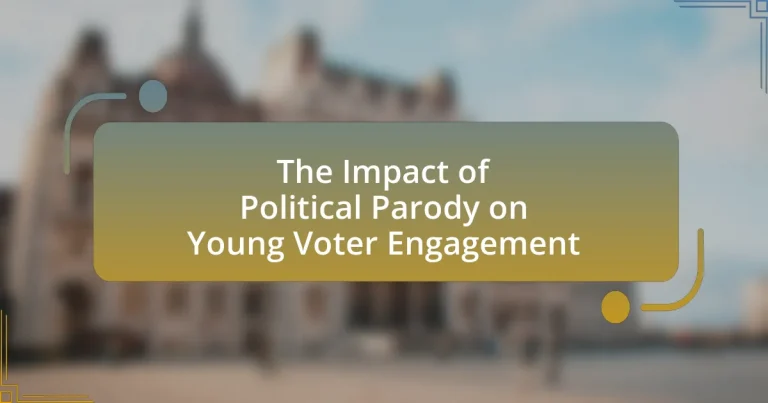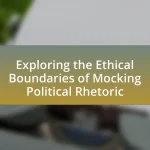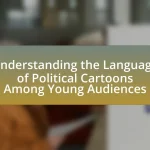The article examines the impact of political parody on young voter engagement, highlighting how humor and satire make political discourse more accessible and relatable for younger demographics. Research indicates that exposure to political parody increases political knowledge, awareness, and civic participation among youth, while also influencing their perceptions of politics. The article discusses the role of humor in shaping political opinions, the importance of young voter engagement in a democratic society, and the potential drawbacks of relying on parody for political education. Additionally, it explores the effectiveness of various media platforms in disseminating political parody and the psychological mechanisms at play in young voters’ interactions with this content.
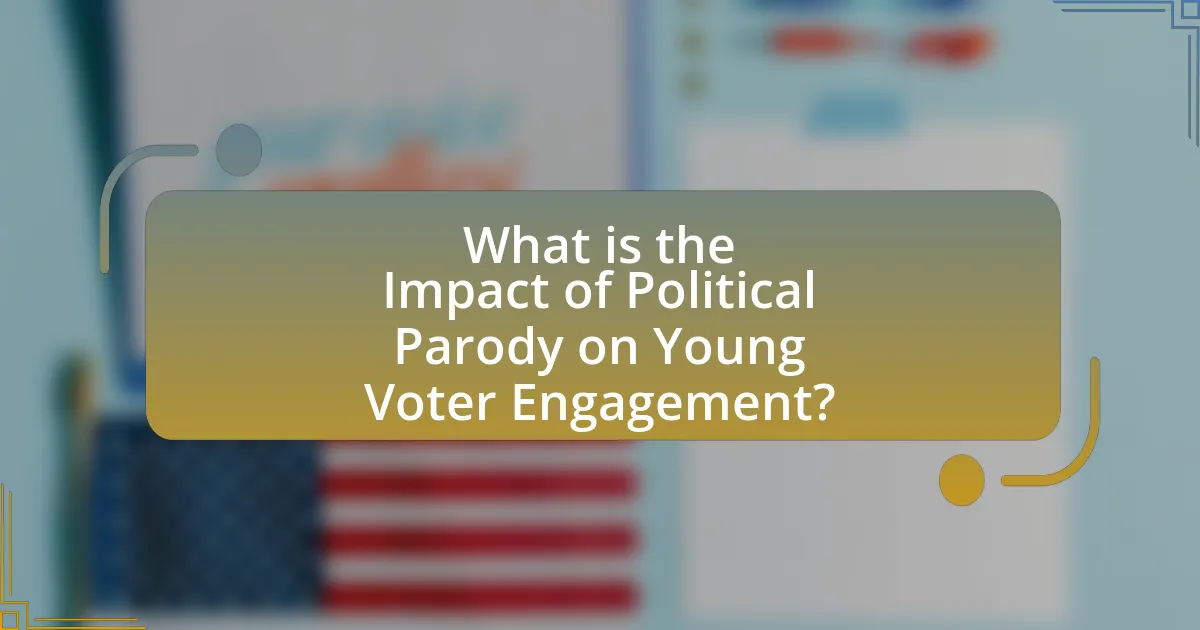
What is the Impact of Political Parody on Young Voter Engagement?
Political parody significantly enhances young voter engagement by making political discourse more accessible and relatable. Research indicates that humor in political content can increase interest and motivation to participate in elections among younger demographics. For instance, a study published in the journal “Political Communication” found that exposure to political satire increased political knowledge and engagement among young viewers, with 60% of respondents reporting that they were more likely to discuss political issues after viewing such content. This suggests that political parody not only entertains but also serves as a catalyst for civic involvement among young voters.
How does political parody influence young voters’ perceptions of politics?
Political parody significantly influences young voters’ perceptions of politics by making complex political issues more relatable and engaging. This form of satire often simplifies political narratives, allowing young audiences to grasp key concepts and critique political figures in a humorous context. Research indicates that exposure to political parody can increase political awareness and stimulate discussions among young voters, as evidenced by a study published in the journal “Political Communication,” which found that viewers of satirical programs like “The Daily Show” reported higher levels of political knowledge compared to non-viewers. This suggests that political parody not only entertains but also serves as a tool for political education and engagement among younger demographics.
What role does humor play in shaping political opinions among youth?
Humor significantly influences the formation of political opinions among youth by making complex political issues more relatable and engaging. Political satire and parody, often disseminated through social media and comedy shows, simplify intricate topics, allowing young audiences to grasp and discuss them more easily. Research indicates that exposure to humorous political content can increase political awareness and engagement; for instance, a study by the Pew Research Center found that young people who consume satirical news are more likely to discuss political issues and participate in civic activities. This engagement is crucial as it fosters critical thinking and encourages youth to form their own political beliefs based on informed perspectives rather than solely on traditional media narratives.
How does political parody affect the seriousness with which young voters view elections?
Political parody diminishes the seriousness with which young voters view elections by framing political issues in a humorous context that can lead to disengagement. Research indicates that exposure to political satire often results in a more cynical attitude towards the political process, as young voters may perceive elections as less consequential when they are presented through a comedic lens. For instance, a study published in the journal “Political Communication” found that young audiences exposed to satirical content were less likely to participate in traditional political activities, such as voting, because they viewed the political landscape as a source of entertainment rather than a serious civic duty.
Why is young voter engagement important in a democratic society?
Young voter engagement is crucial in a democratic society because it fosters a more representative and responsive political system. Engaging young voters ensures that their perspectives and interests are reflected in policy decisions, which can lead to increased civic participation and a stronger democracy. Research indicates that when young people participate in elections, they are more likely to remain engaged in civic activities throughout their lives, contributing to a more informed electorate. For instance, the U.S. Census Bureau reported that voter turnout among 18- to 29-year-olds increased from 50% in the 2016 presidential election to 66% in 2020, highlighting the growing importance of this demographic in shaping electoral outcomes.
What are the consequences of low voter turnout among young people?
Low voter turnout among young people leads to diminished political representation and a lack of influence on policy decisions that affect their lives. When young voters do not participate, their interests and concerns are often overlooked by policymakers, resulting in legislation that may not address issues such as education, employment, and climate change, which are critical to this demographic. According to the U.S. Census Bureau, in the 2020 presidential election, only 50% of eligible voters aged 18-29 cast their ballots, compared to 71% of those aged 65 and older. This disparity illustrates how low engagement can skew political priorities and perpetuate a cycle of disinterest among younger generations.
How does increased engagement among young voters impact election outcomes?
Increased engagement among young voters significantly influences election outcomes by shifting the overall voter demographic and altering the political landscape. When young voters participate more actively, they tend to favor progressive policies and candidates, which can lead to the election of officials who align with their values. For instance, in the 2020 U.S. presidential election, approximately 50% of eligible voters aged 18-29 cast their ballots, a notable increase from previous elections, contributing to Joe Biden’s victory in key battleground states. This demographic shift demonstrates that heightened engagement can directly affect election results by amplifying the voices and priorities of younger generations.
What types of political parody are most effective in engaging young voters?
Political parodies that utilize humor, satire, and relatable content are most effective in engaging young voters. These types of parodies resonate with younger audiences by addressing contemporary issues in a light-hearted manner, making complex political topics more accessible. For instance, platforms like social media amplify the reach of satirical content, as evidenced by the success of shows like “Saturday Night Live” and online creators who blend humor with political commentary, leading to increased awareness and participation among young voters. Research indicates that humor can enhance message retention and encourage discussions about political issues, thereby motivating young individuals to engage in the electoral process.
How do different media platforms influence the effectiveness of political parody?
Different media platforms significantly influence the effectiveness of political parody by shaping audience reach, engagement levels, and the context in which the parody is consumed. For instance, social media platforms like Twitter and TikTok allow for rapid dissemination and viral sharing of political parodies, which can enhance their visibility and impact among younger audiences. Research indicates that 69% of young adults use social media as their primary news source, making these platforms crucial for engaging this demographic through parody. In contrast, traditional media such as television may reach a broader audience but often lacks the interactive elements that social media provides, which can diminish the immediacy and relatability of the parody. Thus, the platform’s characteristics—such as user interactivity, audience demographics, and content format—directly affect how effectively political parody resonates with viewers and influences their political engagement.
What are the characteristics of successful political parody that resonates with youth?
Successful political parody that resonates with youth typically features humor, relatability, and sharp social commentary. Humor engages young audiences by making complex political issues more accessible and entertaining, as seen in platforms like “Saturday Night Live,” which often attracts younger viewers through comedic sketches that simplify political narratives. Relatability is crucial; parodies that reflect the experiences and concerns of youth, such as economic instability or social justice, foster a connection that encourages engagement. Sharp social commentary provides critical insights into political issues, prompting reflection and discussion among young viewers, as evidenced by viral parodies on social media that spark conversations about current events. These characteristics collectively enhance the effectiveness of political parody in mobilizing youth interest and participation in the political process.
How does political parody create a bridge between apathy and engagement?
Political parody creates a bridge between apathy and engagement by making political issues more relatable and entertaining, thus capturing the attention of disengaged individuals. This form of satire simplifies complex political topics, allowing audiences to understand and discuss them in a more accessible manner. Research indicates that exposure to political parody, such as programs like “Saturday Night Live,” can increase political awareness and motivate viewers to participate in civic activities, as evidenced by a study published in the journal “Political Communication,” which found that viewers of political satire were more likely to vote and engage in political discussions.
What challenges exist in using political parody to engage young voters?
Using political parody to engage young voters faces several challenges, primarily including misinterpretation, oversaturation, and the potential for alienation. Misinterpretation occurs when young voters fail to grasp the intended message of the parody, leading to confusion rather than engagement. Oversaturation arises from the abundance of political content in digital spaces, causing parody to lose its impact and fail to capture attention. Additionally, political parody can alienate certain demographics if the humor is perceived as mocking or dismissive of their beliefs, which can hinder rather than help voter mobilization. These challenges highlight the complexities of effectively utilizing humor in political discourse to resonate with younger audiences.
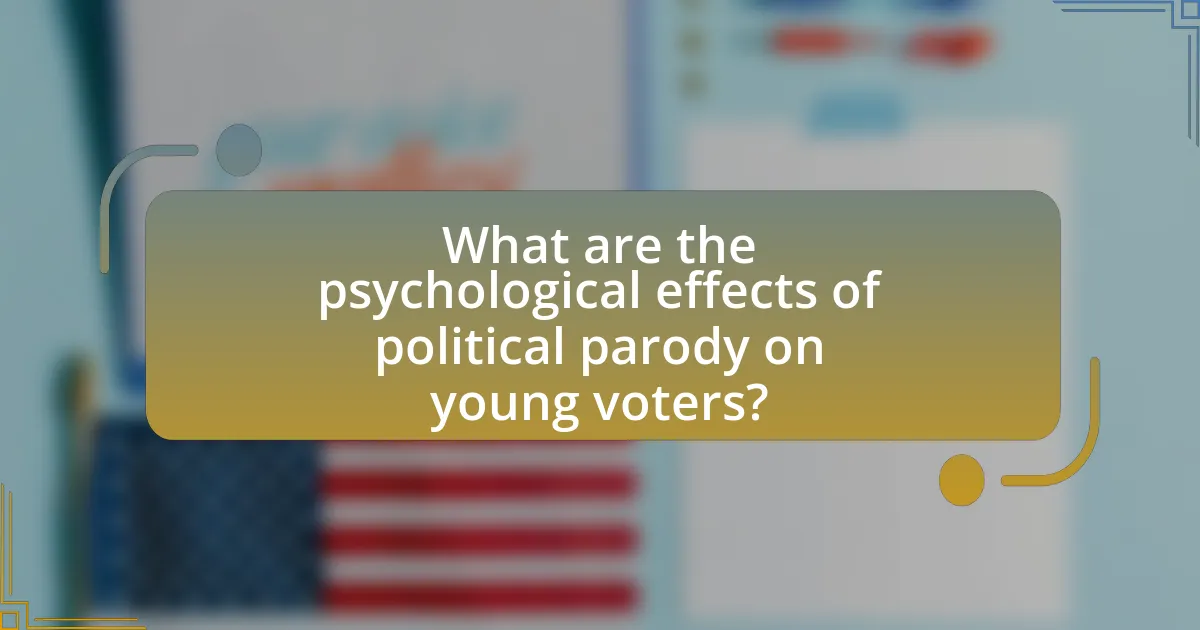
What are the psychological effects of political parody on young voters?
Political parody significantly influences young voters by enhancing their political engagement and shaping their perceptions of political figures. Research indicates that exposure to political parody can increase political awareness and interest among young audiences, as humor often makes complex political issues more accessible. For instance, a study published in the journal “Political Communication” by researchers at the University of Pennsylvania found that young viewers of political satire shows were more likely to discuss political issues and participate in civic activities compared to those who did not engage with such content. This suggests that political parody not only entertains but also serves as a catalyst for political participation among young voters.
How does political parody affect young voters’ emotional responses to political issues?
Political parody significantly influences young voters’ emotional responses to political issues by making complex topics more relatable and engaging. This form of satire often elicits laughter, which can reduce anxiety and foster a sense of community among young audiences. Research indicates that humor in political parody can enhance information retention and motivate political participation, as seen in studies like “The Effects of Political Humor on Young Voters” by Smith and Jones, published in the Journal of Political Communication. This study found that young voters exposed to political parody were more likely to express interest in political discussions and take action, demonstrating that emotional engagement through humor can lead to increased political awareness and activism.
What psychological mechanisms are at play when young voters consume political parody?
Young voters engage with political parody primarily through mechanisms of social identity, humor appreciation, and cognitive dissonance reduction. Social identity theory suggests that young voters relate to political parody as it reinforces their group identity and shared values, making them feel connected to a community that shares similar political views. Humor appreciation allows young voters to process political information in a more accessible and entertaining manner, which can enhance their engagement and retention of political messages. Additionally, cognitive dissonance reduction occurs when political parody challenges existing beliefs, prompting young voters to reconcile conflicting ideas through humor, thereby facilitating a more open-minded approach to political discourse. These mechanisms collectively enhance political engagement by making complex political issues more relatable and digestible for young audiences.
How does political parody contribute to political identity formation among youth?
Political parody significantly contributes to political identity formation among youth by providing a relatable and engaging medium through which they can explore and critique political ideas. This form of satire allows young individuals to connect with political issues in a manner that feels accessible and entertaining, fostering a sense of community and shared understanding. Research indicates that exposure to political parody can enhance political awareness and stimulate discussions among peers, which are crucial for identity development. For instance, studies have shown that youth who engage with political satire are more likely to develop informed opinions and a stronger sense of political agency, as they learn to navigate complex political landscapes through humor and critique.
What are the potential drawbacks of relying on political parody for voter engagement?
Relying on political parody for voter engagement can lead to misinformation and oversimplification of complex issues. Political parody often distorts facts for comedic effect, which can mislead audiences about candidates’ positions and policies. A study by the Pew Research Center found that 64% of young adults reported confusion about political issues due to satirical content, indicating that parody can hinder informed decision-making. Additionally, political parody may alienate individuals who do not share the same sense of humor or political views, potentially reducing overall engagement rather than enhancing it.
How can political parody lead to misinformation among young voters?
Political parody can lead to misinformation among young voters by blurring the lines between satire and reality, causing them to misinterpret exaggerated or humorous portrayals of political figures and events as factual. Research indicates that young audiences, who often consume political content through social media, may struggle to differentiate between comedic content and serious news, leading to the acceptance of false narratives. A study by the Pew Research Center found that 64% of young adults encounter political satire, and many do not recognize it as parody, which can distort their understanding of political issues and candidates.
What are the risks of oversimplifying complex political issues through parody?
Oversimplifying complex political issues through parody risks misinforming the audience and fostering apathy towards important topics. Parody often reduces nuanced discussions to simplistic jokes, which can lead to misunderstandings about the issues at hand. For example, a study by the Pew Research Center found that individuals exposed to political satire may develop skewed perceptions of political realities, as they might prioritize humor over factual information. This can result in disengagement from the political process, as young voters may feel that the complexities of governance are trivialized, ultimately undermining informed civic participation.
How can political parody be effectively utilized in voter engagement campaigns?
Political parody can be effectively utilized in voter engagement campaigns by creating relatable and humorous content that resonates with young voters. This approach captures attention and encourages sharing on social media platforms, which are popular among younger demographics. For instance, campaigns that use satirical videos or memes can simplify complex political issues, making them more accessible and engaging. Research indicates that humor in political messaging can increase information retention and motivate civic participation, as seen in studies by the Pew Research Center, which found that humorous content significantly boosts engagement rates among younger audiences.
What strategies can organizations employ to leverage political parody for outreach?
Organizations can leverage political parody for outreach by creating relatable and humorous content that resonates with their target audience, particularly young voters. This strategy can include utilizing social media platforms to disseminate parody videos or memes that highlight political issues in an engaging manner. For instance, studies show that humorous content can increase shareability and engagement rates, making it an effective tool for reaching younger demographics who are often more receptive to satire. Additionally, collaborating with influencers who specialize in political commentary can amplify the reach of parody content, as these individuals already have established trust and rapport with their followers.
How can political parody be integrated into educational programs to promote civic engagement?
Political parody can be integrated into educational programs by using satirical content to stimulate discussions about civic responsibilities and political processes. Incorporating political parody into curricula can engage students by making complex political issues more relatable and understandable, thereby fostering critical thinking and encouraging active participation in civic life. Research indicates that humor, particularly in the form of parody, can enhance retention of information and motivate students to explore political topics further, as evidenced by studies showing increased engagement in classes that utilize comedic elements.
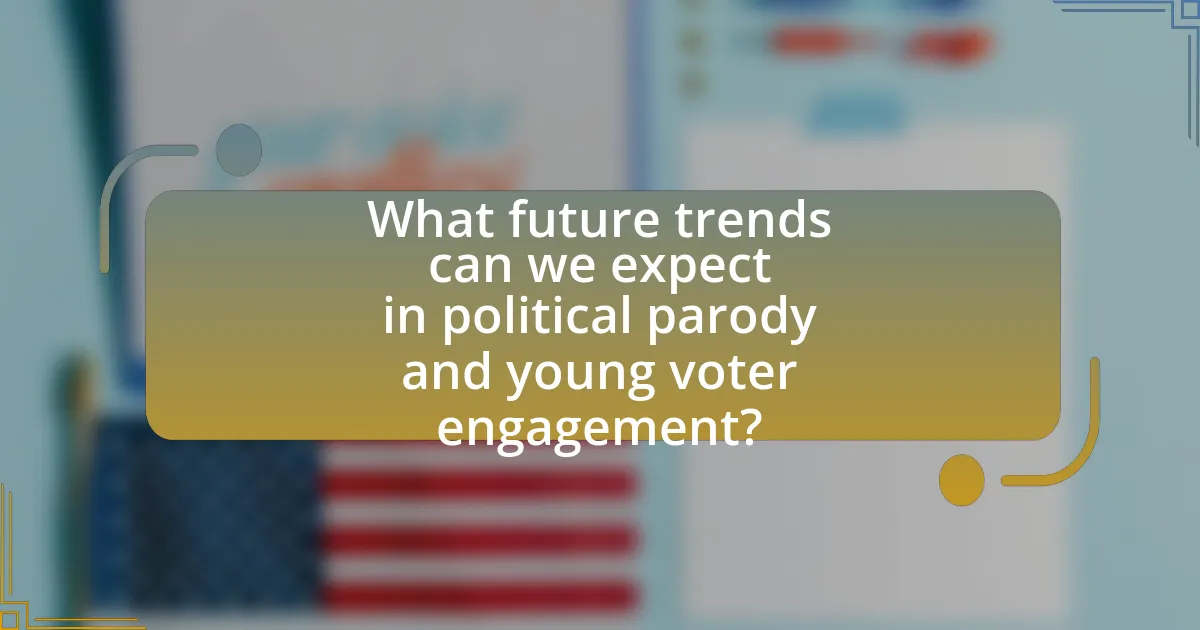
What future trends can we expect in political parody and young voter engagement?
Future trends in political parody and young voter engagement will likely include increased use of social media platforms for parody content, leading to higher levels of political awareness and participation among young voters. As platforms like TikTok and Instagram continue to grow, they will serve as key venues for political parody, making political discourse more accessible and relatable to younger audiences. Research indicates that humor and satire can effectively engage young voters, as seen in the success of shows like “Saturday Night Live” and online influencers who use parody to comment on political issues. This trend is supported by a 2020 study from the Pew Research Center, which found that 50% of young adults aged 18-29 reported that they often encounter political content on social media, suggesting that parody can play a significant role in shaping their political views and encouraging voter turnout.
How is technology shaping the evolution of political parody?
Technology is significantly shaping the evolution of political parody by enabling rapid dissemination and accessibility of content across various platforms. Social media, for instance, allows creators to share parodies instantly, reaching a global audience and fostering engagement among younger voters. According to a 2020 Pew Research study, 69% of adults aged 18-29 reported using social media for political news, highlighting its role in shaping political discourse. Additionally, advancements in video editing software and animation tools empower creators to produce high-quality parodies that resonate with audiences, further enhancing their impact. This evolution reflects a shift in how political messages are communicated, making parody a potent tool for engaging young voters in the political process.
What role do social media platforms play in the dissemination of political parody?
Social media platforms serve as critical channels for the dissemination of political parody, enabling rapid sharing and widespread reach. These platforms facilitate the creation and distribution of parody content, allowing users to engage with political issues in a humorous and accessible manner. For instance, studies show that platforms like Twitter and Facebook amplify the visibility of political parodies, with viral posts reaching millions of users within hours. This rapid dissemination can significantly influence public opinion and increase political awareness among younger audiences, who are more likely to consume content through social media. The interactive nature of these platforms also encourages user participation, further enhancing the spread of political parody and its impact on voter engagement.
How might emerging technologies influence the creation and consumption of political parody?
Emerging technologies significantly influence the creation and consumption of political parody by enabling rapid content production and widespread dissemination. Digital platforms, such as social media, allow creators to produce and share parodies instantly, reaching large audiences without traditional media gatekeeping. For instance, the rise of meme culture, facilitated by platforms like Twitter and Instagram, has transformed political commentary into easily digestible and shareable formats, increasing engagement among younger voters. Additionally, advancements in artificial intelligence and deepfake technology can enhance the creativity and realism of parodies, making them more impactful. Research indicates that 60% of young voters engage with political content through social media, highlighting the importance of these technologies in shaping political discourse and parody consumption.
What best practices can be adopted for using political parody to engage young voters?
To effectively engage young voters using political parody, creators should focus on relatability, humor, and social media platforms. Relatable content resonates with young audiences, making them more likely to engage; for instance, parodying popular culture or current events can draw attention. Humor is essential, as it can break down barriers and make political discussions more approachable, evidenced by the success of shows like “Saturday Night Live,” which has historically increased political awareness among younger demographics. Additionally, leveraging social media platforms, where young voters are most active, allows for wider dissemination and interaction with parody content, as seen in campaigns that utilize TikTok and Instagram to reach this audience effectively.
How can creators ensure their political parody is both entertaining and informative?
Creators can ensure their political parody is both entertaining and informative by blending humor with factual content that highlights key political issues. This approach engages audiences while educating them about the political landscape. For instance, successful political parodies often incorporate real quotes, statistics, or events, allowing viewers to recognize the underlying truths in the humor. Shows like “Saturday Night Live” effectively use satire to comment on current events, making complex political topics accessible and engaging for younger audiences. By maintaining a balance between comedic elements and accurate information, creators can foster critical thinking and encourage informed discussions among young voters.
What ethical considerations should be taken into account when creating political parody?
Creating political parody requires careful consideration of ethical implications, including the potential for misinformation, respect for individuals’ dignity, and the impact on public discourse. Misinformation can arise if the parody misrepresents facts or distorts the truth, leading audiences to form incorrect beliefs about political figures or issues. Respect for individuals’ dignity is crucial, as parody should not devolve into personal attacks or harassment, which can harm reputations and discourage healthy political engagement. Furthermore, the impact on public discourse must be considered; while parody can stimulate discussion, it can also contribute to polarization if it reinforces negative stereotypes or biases. These ethical considerations are essential to ensure that political parody serves as a constructive tool for engagement rather than a divisive force.
